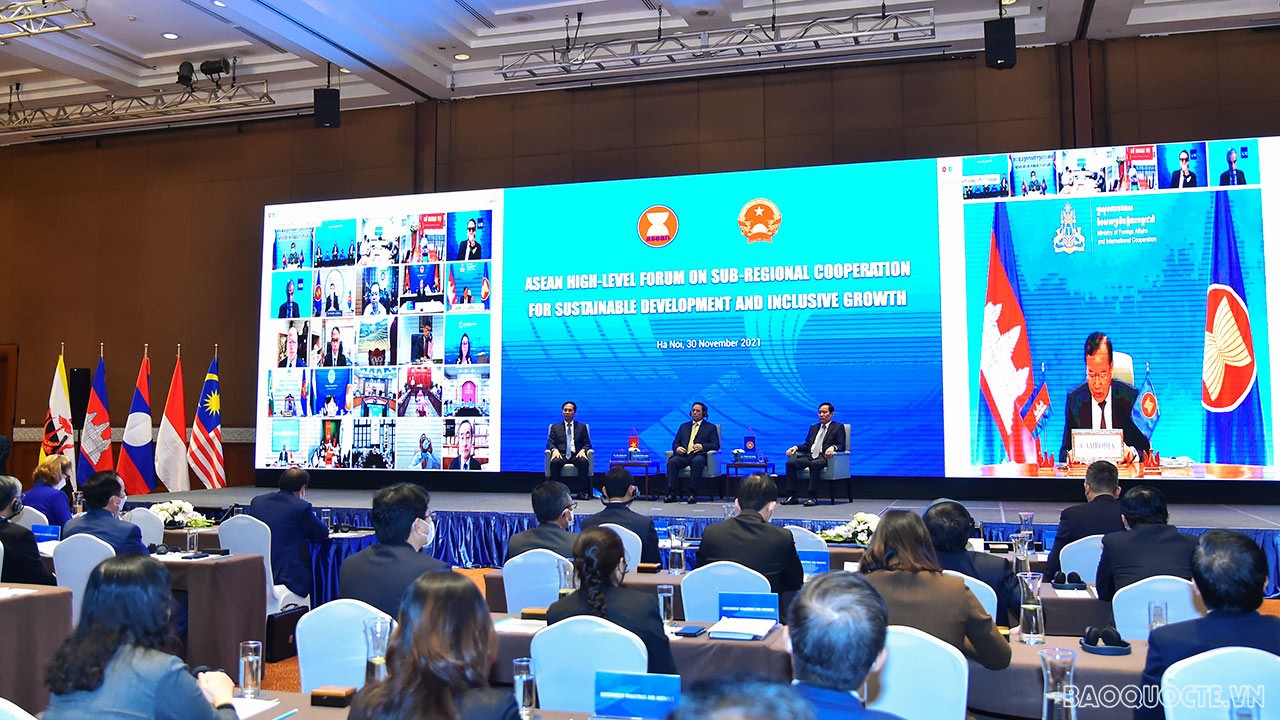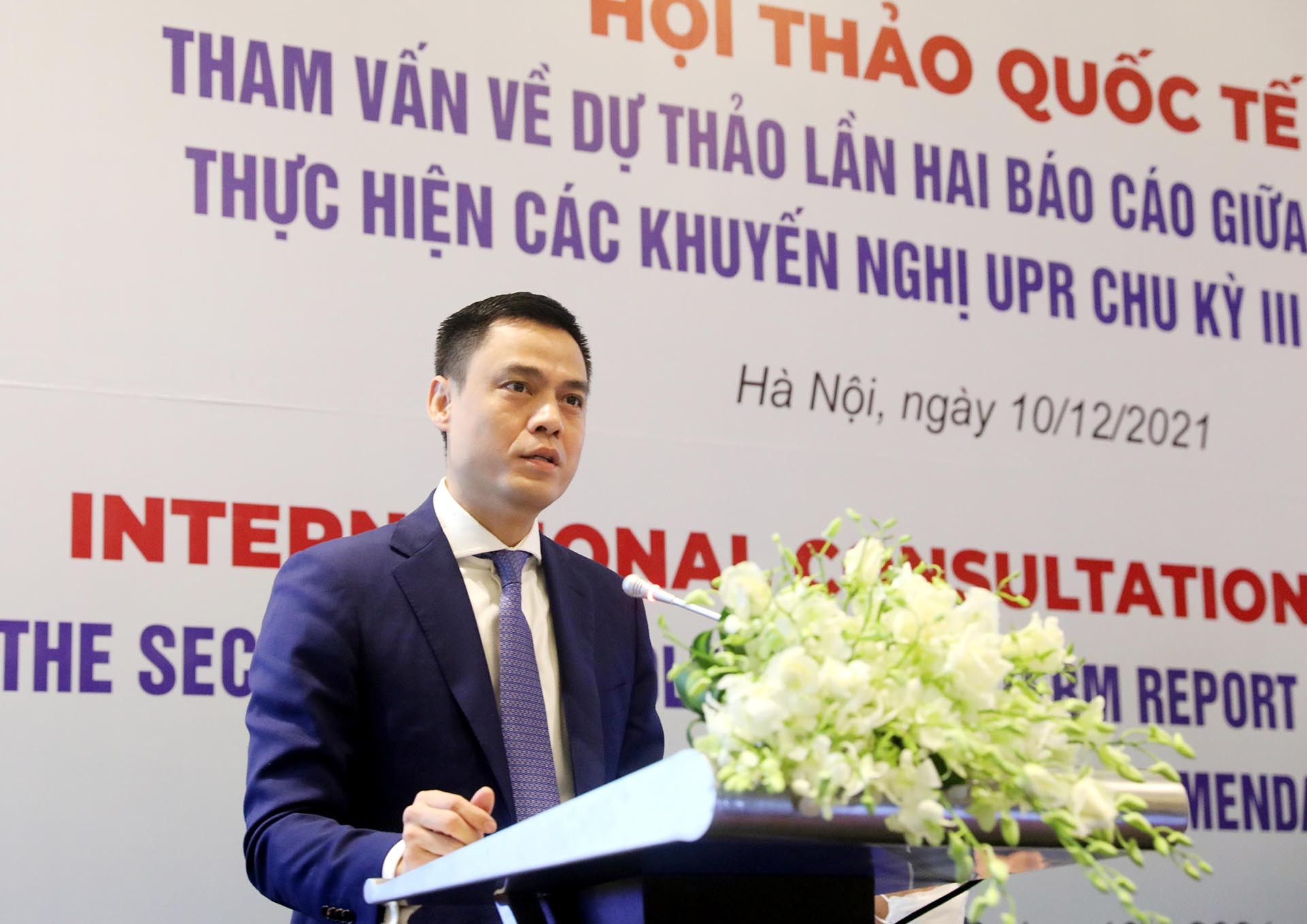
Synergy - the key to multilateral diplomacy
Latest
 |
| Prime Minister Pham Minh Chinh attended Viet Nam-initiated ASEAN high-level forum on sub-regional cooperation for sustainable development and inclusive growth held in both in-person and virtual forms on November 30, 2021. (Photo: Tuan Anh) |
Could you highlight some of Viet Nam’s recent achievements in multilateral diplomacy and their significance to the prestige and standing of our country?
In implementing the guidelines of the 12th and 13th National Party Congresses and Directive 25 dated August 8, 2018 issued by the Party’s Secretariat, over the past years, Viet Nam’s multilateral diplomacy has gained great successes as part of the foreign policy achievements and contributed to the country’s international prestige and standing.
Notably, we have successfully assumed the ASEAN Chairmanship 2020 and AIPA 41 Presidency, affirming our leading role within ASEAN. We have promoted our proactive role as the United Nations (UN) Security Council non-permanent member for 2020-2021. On this position, we have made substantive contributions to the negotiation and settlement of many complicated conflicts and disputes. We have also hosted the second U.S. – DPRK Summit in 2019.
In the field of peace and security, Viet Nam has made active and practical contributions to multilateral activities such as the ASEAN Defense Ministers’ Meeting (ADMM), ASEAN Defense Minister’s Meeting-Plus (ADMM-Plus), Shangri-la Dialogue, and the Beijing - Xiangshan Forum. Through these forums, we aimed to promote trust, and prevent and remove the shared security threats, including the security threats to the South China Sea. We have sent 246 officers and soldiers to the UN peacekeeping operations and three Level 2 field hospitals. In the next period, we will expand the area and field of participation to include military engineers and civilian police.
Regarding economy and development, Viet Nam has actively joined the negotiation, signing and ratification of the Comprehensive and Progressive Agreement for Trans-Pacific Partnership (APTPP), the European Union–Viet Nam Free Trade Agreement (EVFTA) and the Regional Comprehensive Economic Partnership (RCEP), as well as the discussion on APEC vision by 2040. Through these engagements, we have shaped the economic and commercial structure and regulations. We have also proposed various initiatives on specialized cooperation at multilateral forums on science, information and technology, health, culture and society, environment, agriculture, customs, audit, among others.
Viet Nam’s strong commitment to climate change at the recent COP26 Conference has been highly appreciated by international public opinion and is seen as an important element of the Conference’s outcomes. Vaccine diplomacy through multilateral cooperation mechanisms has greatly contributed to the country’s successes in COVID-19 prevention and combat.
Moreover, Viet Nam has actively stood for election and partook in multiple UN mechanisms and forums such as the International Law Commission (ILC) for the term 2023-2027, the UNESCO Executive Council for the 2021-2025 term, the Board of Governors of the International Atomic Energy Agency (IAEA) for the term 2021-2023, the Postal Operations Council of the Universal Postal Union (UPU) for the term 2022-2025. We are now running for a seat at the United Nations Human Rights Council for the term 2023-2025.
These achievements are proud milestones for the remarkable growth of multilateral diplomacy in amid the period of comprehensive integration, substantively contributing to the reform and development of the country.
This is attributable to the close instruction and direct participation of high-level leaders, the actions of the whole political system with Party Diplomacy, State Diplomacy and People’s Diplomacy as the three major drivers, and close and effective coordination between Ministries, departments, agencies and localities.
What chances and challenges are facing Viet Nam’s multilateral diplomacy?
The current regional and global landscape is witnessing rapid and unpredictable developments. Conflicts, disputes and instability occurs in many regions. We see the policy adjustment and strategic competition among major powers focusing on the Asia-Pacific, and the continued trend of unilateral acts, power politics, and inward-looking, protectionist policies.
Meanwhile, the acts of power gathering among actors at multilateral forums is ever diverse, flexible, and interests-based. Non-traditional security issues such as climate change, pandemics, particularly COVID-19, food security, water resources, energy, terrorism, transnational crime, and cyber security is becoming more serious. Economic recovery and transformation still entail lots of risks and uncertainties. At the same time, there are challenges to the maintenance of regime, security, stability, independence, sovereignty, and territorial integrity.
However, there are opportunities to fully and effectively strengthen multilateral foreign affairs.
First of all, the aspiration for peace, cooperation and development of nations and peoples, together with the need to bolster multilateral cooperation with the UN, plays a central role, while upholding international law made the cooperation in response to global issues more urgent than ever.
Second, the Asia-Pacific, especially Southeast Asia, continues to be the convergence of strategic interests of major powers and the hub of new economic linkages. This opens up the opportunities to link national interests with international and regional ones.
Third, the achievements of 35 years national reform (Doi Moi) and the direction of the 13th National Party Congress remain important prerequisites for our continued implementation of the foreign policy of independence, self-reliance, multilateralization and diversification, proactive, comprehensive and effective international integration. With that, we shall bring Viet Nam’s multilateral diplomacy to a new height. In addition, within our ability and when the situation allows, we aim at being the core and the leader of international architecture.
Fourth, the multilateral diplomacy has been involving the entire political system, the attention and supervision of the Party and State leaders, the closer participation and coordination of Ministries and Departments, as well as grown skills and capabilities of the staff working in multilateral diplomacy.
Fifth, multilateral diplomacy, when properly positioned, can be combined with bilateral foreign relations to give new impetus to the country’s development and standing.
 |
| Deputy FM Dang Hoang Giang delivered remarks at the international consultation workshop on the second draft voluntary mid-term report on the implementation of UPR third cycle recommendations. (Photo: Lâm Khánh) |
In order to continue boosting multilateral diplomacy following Directive 25 of the Party’s Secretariat, what will be the focus of Viet Nam’s multilateral diplomacy?
Facing challenges intertwined with opportunities in the region in the world, in my opinion, the priorities of Viet Nam’s multilateral diplomacy should be:
First, we need to continue with the effective implementation of the goals and tasks set out in the 13th National Party Congress and Directive 25. Multilateral diplomatic activities must be conducted comprehensively and synchronously in the areas of economy, politics, national defense, security, society, environment, education and training, science and technology, particularly the implementation of sustainable development goals, the resolution of global issues, and the increase of participation in UN peacekeeping activities. Ministries and Departments need to catch up with new trends and thoughts, enhance the effectiveness of coordination, and actively and substantively engage in multilateral forums, particularly ASEAN, UN, APEC, Mekong sub-regional cooperation, institutions of the Asia-Pacific, and in strategic issues related to Viet Nam’s development and security priorities.
Second, we should continue to make efforts to promote our role, contribution and identity in shaping regional and global governance frameworks and regulations; promote our priorities and initiatives such as the compliance with international law and the UN Charter, the response to non-traditional security challenges, the building of economic, trade and financial order that is fair and healthy. With these efforts, we will connect Viet Nam’s contribution across the UN bodies and with other multilateral forums.
Third, when the situation allows, we will strive for the pivotal role, the mediator and the leader who shapes the rules and orders at multilateral forums. To this end, we will host major international conferences and apply to hold important positions at international organizations.
In the near future, we need to continue to fulfill our current positions and roles at UN agencies, especially the Security Council, the UNESCO Executive Council, and the International Law Commission. Through multilateral activities, we will learn the lessons and be prepared for the UN Human Rights Council for 2023-2025, ASEAN Chair 2030, and the next term at the UN Security Council in the next 10 to 15 years.
Besides, it is necessary to urgently develop and implement a plan to promote Vietnamese candidates to leadership positions of important multilateral mechanisms to serve the country’s demand on international integration.
Fourth, we should make use of the prestige and standing built when taking up current and previous important international roles to continue deepening bilateral ties with countries and international organizations; strengthen international cooperation to take advantage of the resources for our development, with priority to COVID-19 vaccines and policy advice and support for post-pandemic recovery.
Fifth, we should promote information and communication within Viet Nam and overseas to raise awareness on the importance of multilateral diplomacy, at the same time improve the position and present the image of the country to the world, perfect the coordination mechanism, encourage the implementation of multilateral diplomacy; strengthen strategic research and forecasting on global issues and major multilateral forums.
Sixth, continue to build a multidisciplinary and interdisciplinary approach in the context of strong globalization, thus, the emerging concepts become far more profound and multi-layered.
The guideline for/ key to multilateral diplomacy is to promote the synergy of the whole political system under the unified leadership of the Party and the centralized management of the State, the close coordination among Party Diplomacy, State Diplomacy, People’s Diplomacy, and State’s diplomacy, and between external activities and domestic growth; to mobilize all potentials of the whole society to best serve the country’s intensive international integration.












